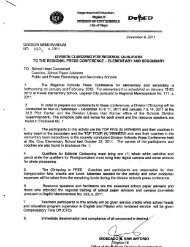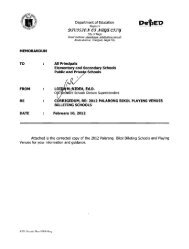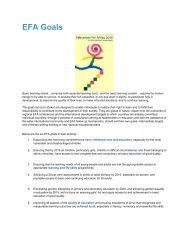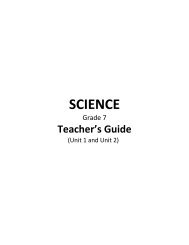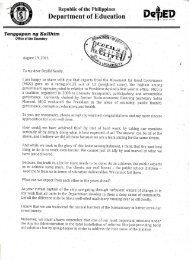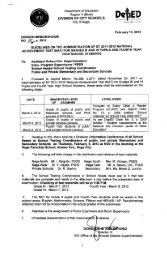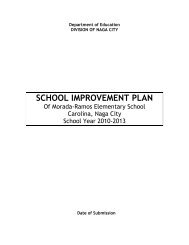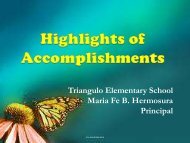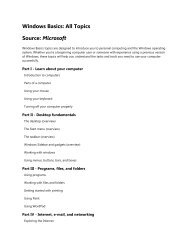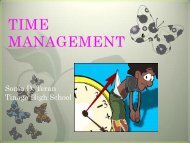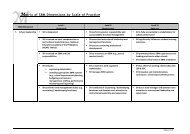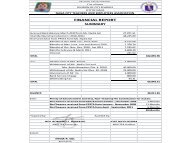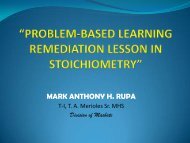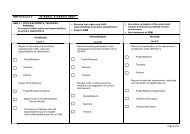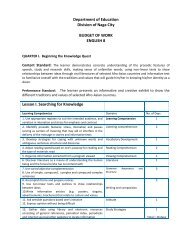K to 12 Curriculum Guide SCIENCE - DepEd Naga City
K to 12 Curriculum Guide SCIENCE - DepEd Naga City
K to 12 Curriculum Guide SCIENCE - DepEd Naga City
Create successful ePaper yourself
Turn your PDF publications into a flip-book with our unique Google optimized e-Paper software.
K TO <strong>12</strong> <strong>SCIENCE</strong><br />
Grade/Level<br />
Grade Level Standards<br />
They will also investigate how various forms of energy travel through different media.<br />
After studying how organ systems work <strong>to</strong>gether in plants and animals in the lower grades, learners will now observe very small organisms<br />
and structures using a microscope. They will understand that living things are organized in<strong>to</strong> different levels: cells, tissues, organs, organ<br />
systems, and organisms. These organisms comprise populations and communities which interact with nonliving things in ecosystems.<br />
Learners will now recognize reproduction as a process of cell division resulting in growth of organisms. They will also deal deeper in<strong>to</strong> the<br />
process of digestion studied in the lower grades giving emphasis on proper nutrition for overall wellness. This will lead them <strong>to</strong> participate<br />
in activities that will protect and conserve economically important species used for food.<br />
Grade 8<br />
Learners will explain the behavior of matter in terms of the particles it is made of. They will also recognize that ingredients in food and<br />
medical products are made up of these particles and are absorbed by the body in the form of ions.<br />
Learners will explain how active faults generate earthquakes and how tropical cyclones originate from warm ocean waters. They will also<br />
learn about the other members of the solar system.<br />
Learners will investigate the effects of some fac<strong>to</strong>rs on the motion of an object based on the Laws of Motion. They will also differentiate<br />
the concept of work as used in science and in layman’s language. They will also learn about fac<strong>to</strong>rs that affect the transfer of energy such<br />
as the molecular structure of the medium and temperature difference.<br />
After learning about the digestive system, learners will now expand their knowledge <strong>to</strong> a deeper understanding of the respira<strong>to</strong>ry and<br />
circula<strong>to</strong>ry systems <strong>to</strong> promote overall health. They will also learn about some technologies that will introduce desired traits in<br />
economically important plants and animals.<br />
Grade 9<br />
Learners will explain how new materials are formed when a<strong>to</strong>ms are rearranged. They will also recognize that a wide variety of useful<br />
compounds may arise from such rearrangements.<br />
Learners will identify volcanoes in the community or region and distinguish between active and inactive ones. They will also explain how<br />
energy from volcanoes may be tapped for human use. Learners will also learn about climatic phenomena that occur on a global scale.<br />
They will also explain why certain constellations can be seen only at certain times of the year.<br />
Learners will predict the outcomes of interactions among objects in real life applying the laws of conservation of energy and momentum.<br />
K <strong>to</strong> <strong>12</strong> <strong>Curriculum</strong> <strong>Guide</strong> Science – version as of January 31, 20<strong>12</strong> 7



